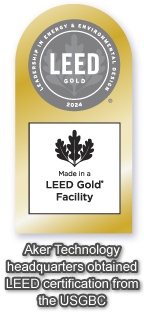Sustainable development
Aker Technology has been established for over 30 years. Reflecting on 2023, we recognize the widespread slowdown in global economic activity, severe inflation, industry inventory adjustments, and the ongoing conflict between Ukraine and Russia, all contributing to a decline in global economic growth rates. However, thanks to the efforts of our dedicated team and a robust business foundation, Aker has maintained stable growth through enhanced production efficiency, improved product quality, and strict control of unnecessary expenditures.
In response to the urgent challenges posed by climate change, our company has initiated multiple projects aimed at addressing sustainability issues. In 2023, we commenced a greenhouse gas inventory and optimized our headquarters and honored to achieve LEED certification from the U.S. Green Building Council. Stakeholders could be fully aware of our sustainability efforts and contributions by accessing the sustainability reports which updated annually. We recognize that alongside our business growth, we also bear a responsibility for social and environmental sustainability. In addition to focusing on business development and product quality, we are committed to enhancing corporate governance, promoting environmentally friendly practices, fulfilling corporate social responsibility, and fostering a safe and supportive work environment. Our goal is to lead the industry toward a sustainable future.
For customers, we consistently operate under the principles of "Integrity, Service, and Quality," providing high-value products and services to fulfill our commitment to customers. For our shareholders, we strive for continuous improvement in quality and customer service to create optimal revenue and returns. We maintain strong corporate governance through a comprehensive internal audit system and relevant departments, ensuring the protection of shareholder interests and allowing shareholders to share in the fruits of our operations.
In terms of employee care, we are committed to ensure employee rights, encouraging continuous learning, and promoting an environment where employees can voice their opinions. We support initiatives such as employee welfare funds, long-service rewards, and education and training programs, dedicated to protecting human rights and preventing discrimination in all forms. Our commitment to occupational health and safety management ensures a secure and healthy work environment, strengthening our safety protocols to reduce workplace accidents.
We aspire for our stable operations to make the company a cornerstone of society stability. Recently, in response to the impacts of climate change on businesses and the international focus on sustainability issues, the government has taken actions such as implementing the International Financial Reporting Standards (IFRS) Sustainability Disclosure Standards and establishing a carbon trading market in Taiwan. The development of our company is closely tied to sustainable practices, and we are committed to adequately preparing for the challenges and responsibilities that come with operating a business.

1. Sustainable Operations: We enhance internal and external communication to establish a trust-based mechanism.
2. Supply Chain Management: We focus on value chain partners and prioritize local sourcing to reduce greenhouse gas emissions.
3. Environmental Sustainability: We stay connected with market trends, compliance with Environmental Safety Regulations.
4. Customer Care: We value customers' feedback to strengthen and optimize partnerships.
5. Employee Care: We focus on employees' career development and foster a friendly workplace.
6. Social Participation: We maintain ongoing communication with stakeholders and integrate their perspectives into our strategic considerations.
We conduct questionnaire for different stakeholders to understand the issues that stakeholders are concerned about. After analysis, they will also be taken into consideration in the company's sustainability policy.

- Contact window:Management Department/Ms. Huang
- Email:vivian@aker.com.tw

- Contact window:Manufacturing Department/Mr. Wang
- Email:yuchang@aker.com.tw

- Contact window:Finance Department/Mr. Chen
- Email:billy@aker.com.tw

- Contact window:Finance Department/Mr. Chen
- Email:billy@aker.com.tw

- Contact window:Finance Department/Mr. Chen
- Email:billy@aker.com.tw

- Contact window:Business Department
- Email:sales@aker.com.tw



